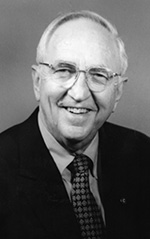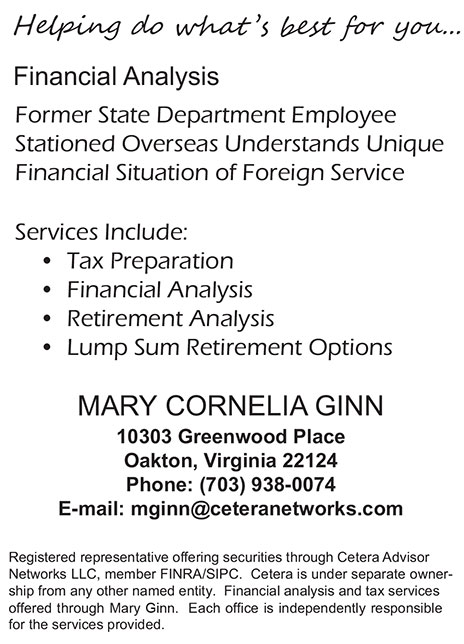Why U.S. Ambassadors Should Be Career Professionals
Speaking Out
BY EDWARD L. PECK
The United States is unique among developed nations in that nearly a third of U.S. embassies—and more than 60 percent of those located in major developed countries—are headed by political appointees without experience in diplomacy. Though some governments do send political appointees to represent them in Washington and other key capitals, the vast majority of their missions are headed by trained career diplomats.
Without a doubt, the ability to raise millions of dollars for a presidential campaign is a valuable skill. But rewarding a fundraiser or “bundler” with the job of heading a U.S. embassy reveals total ignorance of what the job entails. Almost unknown outside diplomatic circles, an ambassador’s responsibilities are numerous, complex and important—sometimes critical. And, as with any and all top management positions, they cannot be effectively carried out by beginners.
Moreover, selling an important federal position in this manner impedes attainment of our international objectives, violates the basic principles of good governance, ignores existing law and is understandably resented by the nations on the receiving end of such appointments.
I do not mean in any way to cast aspersions on the abilities, character, successes, skills, patriotism or other commendable attributes of the nominees. But as a new administration takes office, I submit that it is high time to abolish the spoils system once and for all, for U.S. diplomacy. America does not benefit from this practice.
The Chief of Mission Mandate
In the Foreign Service Act of 1980 (Public Law 96-465), Congress spelled out what chiefs of mission are expected to do, as well as the qualifications required. Section 207, Responsibilities of the Chief of Mission, merits a close reading:
“Under the direction of the president, the chief of mission to a foreign country: (1) shall have full responsibility for the direction, coordination and supervision of all government executive branch employees in that country (except for employees under the command of a United States area military commander); and (2) shall keep fully and currently informed with respect to all activities and operations of the government within that country, and shall insure that all government executive branch employees in that country (except for employees under the command of a United States area military commander) comply fully with all applicable directives of the chief of mission.”
These explicit and extensive responsibilties also appear in the letter of instruction each COM receives from the U.S. president on appointment: “As chief of mission, you have full responsibility for the direction, coordination and supervision of all United States government executive branch employees (except for employees under the command of a United States area military commander).” The letter ends with, “As chief of mission, you are not only my personal representative, but that of our country.”
The COM’s mandate encompasses a massive list of activities to direct, coordinate and supervise. More than two dozen agencies with active roles in foreign policy formulation have personnel operating programs abroad; predictably, these are most numerous in the more important (read pleasant) countries sought by most political appointees. Since agencies cannot instruct each other, effective management of manifold overseas activities is often difficult from Washington, requiring careful coordination.
But foreign policy is only an expression of intentions until it is implemented, and that is an effort that takes place over seas. The COM needs to be able to inject a critical level of control and coordination into the implementation stage of foreign policy on the ground. This requires a firm grounding in the byzantine workings of the domestic interagency arena. Applying the level of control expected by Congress and the president also demands knowledge of agency mandates and what they are actually doing.
Expecting a novice ambassador to perform these tasks effectively ignores the universal requirement of experience for the senior position in any operational entity engaged not in establishing strategic objectives but in producing the desired results. Our embassies are the diplomatic equivalent of “boots on the ground,” endeavoring to implement Washington’s decisions. There is no time for on-the-job-training program for the boss of such missions, who must thoroughly know the business in order to direct it.
The Job Outside the Embassy
Section 304 (a) (2) of the Foreign Service Act specifies that “positions as chief of mission should normally be accorded to career members of the [Foreign] Service, though circumstances will warrant appointments from time to time of qualified individuals who are not career members of the Service” (emphasis added). Further, nominees “should possess clearly demonstrated competence to perform the duties of a chief of mission, including … useful knowledge of the language … and understanding of the history, the culture, the economic and political institutions, and the interests of that country.” The law also states: “… contributions to political campaigns should not be a factor.”
COMs have two basic external functions. First, they must keep host governments informed about American opinions, interests and objectives. Second—equally important, but sometimes more difficult—they are to report local reactions to U.S. initiatives back to Washington and analyze them.
The recipients of such reporting at the White House/National Security Council, the State Department and other agencies should be able to rely on the COM’s previous diplomatic experience and knowledge, as stipulated in the law, and thus his or her ability to present a complete and rational picture. In that regard, it is useful to bear in mind that career diplomats work seamlessly for administrations of either political party, while political appointees are closely tied to the party in power, a bond that can influence their reporting.
Why “Pay to Play” Does Not Hold Up
Despite the irrefutable logic concerning the advantages of relying on experienced professionals for top jobs in every line of endeavor, advocates of political appointees for top diplomatic positions put forward the following arguments in support of novice U.S. ambassadors.
Presidents can choose anyone they want. Wrong. They can nominate whomever they want, but the Senate has a constitutional “advise and consent” role. The only criterion for confirmation should be the expectation of high-level performance. Yet with rare exceptions even the egregiously unqualified are confirmed, since both parties relish their turn to reward bagmen or bagwomen (aka “bundlers”). (It is worth noting that political nominees seldom purchase an embassy with only their own money. Much of what they donate is collected from others.)
Other nations welcome political appointees. Nope. Celebrities may thrill part of the population, but host governments do not want to discuss complicated, important issues with a neophyte, especially one representing a superpower. Consider: Anyone with a health issue would prefer to consult a medical school graduate who earned an M.D., rather than someone handed the degree in return for a large donation.
It is true that few governments publicly complain about such appointees, but editorials in local media make their true feelings about unqualified U.S. ambassadors quite clear. To put it bluntly, sending a beginner with no connection to the host country instead of a trained diplomatic professional is correctly seen as demeaning.
Businesses do the same. Wrong. No company puts a manufacturing facility—the operational equivalent of an embassy—under a neophyte. Embassies are engaged in the hands-on tactics of implementation, not headquarters’ formulation of strategy.
The political appointee can raise issues directly with the president. Conceivable, but highly doubtful. Even if a chief of mission is a friend of the president they might not get through the White House switchboard, let alone broach an arcane subject. And even if they did, an end-run around established communication channels would be more likely to backfire than succeed.
Political appointees can bring fresh perspectives. Inexperience is not a qualification. Dealing with the interests of other nations, often involving contentious, convoluted, long-standing issues, can make new approaches irrelevant or worse. Fresh ideas, if needed, can come from Washington.
The same approach is employed in the Defense Department. Wrong. The COM is equivalent to a field commander. No civilian commands troops, planes or ships. The U.S. military used to sell commissions, until familiarity with warfare was recognized as a better qualification than money. Generals do not command aircraft carriers; admirals never lead infantry divisions.
COMs only need a good deputy chief of mission and staff to do an effective job. Blatant sophistry. If anything, this argument describes a figurehead ambassador, whose most meaningful contribution would be to do as instructed and stay out of the way. If it were true, anyone could be given a title like “Performer of Open Heart Surgery.” Good deputy: “OK, now you can snip off the little ... No! Not that!”
There have been some excellent political ambassadors. True, but this underlines the fundamental problem: nominees are not chosen on the basis of qualifications or anticipated performance. And even if they occasionally perform well, the accolades should go to their deputy chief of mission and staff. The usual result is the installation of non-performers, at best, and genuine embarrassments at worst.
The Smart Money Is on Career Professionals
America has at least some interests in every country in the world. Maintenance and advancement of those interests requires the presence of diplomatic professionals.
No law of nature automatically makes career ambassadors more capable than novices, but they know the business, have been tested and proven deserving of increased responsibility. A political appointee may possess numerous commendable and meaningful skills, but those often have little to do with the specialized work of an ambassador, both in terms of managing the embassy or conducting outreach in the host country.
The smart bet would be to stop placing responsibility for managing our day-to-day bilateral relations in the hands of neophytes. Instead, presidents should turn to the men and women of the Foreign Service, who are ready, willing and able to represent America across the globe, to carry out that function.






